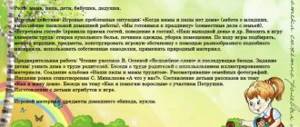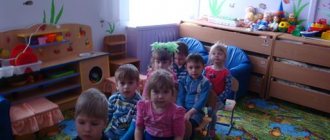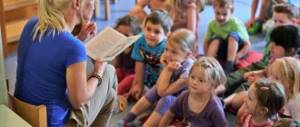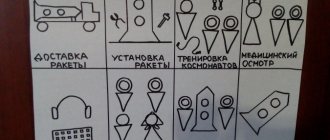“Plot-role-playing game” Performed by teacher: Reznikova E.N. - presentation
Presentation on the topic: “Plot-role-playing game” Performed by teacher: Reznikova E.N.
Without play there is not and cannot be full-fledged mental development. A game is a huge bright window through which a life-giving stream of ideas and concepts flows into the child’s spiritual world. The game is a spark that ignites the flame of inquisitiveness and curiosity. V.A. Sukhomlinsky. Role-playing games are games that are created by children themselves; the activity in children’s games is aimed at fulfilling the plan and developing the plot. Any game contributes to the development of not one, but several qualities, requires the participation of various organs and mental processes, and causes a variety of emotional experiences. The game teaches the child to live and work in a team, develops organizational skills, will, discipline, perseverance, and initiative.
Free story play is the most attractive activity for preschool children. In play, the child experiences an internal subjective feeling of freedom and internal emotional comfort. The game develops the ability to imagine and think creatively. While playing, the child tries on different roles. Masters the rules of interaction and learns to explain his actions and coordinate them with others. Principles for organizing a story game 1. The teacher must play with the children (the “playing partner” position) 2. The teacher must play with the children throughout preschool childhood. 3. At each stage of preschool childhood, develop play skills, orienting the child to carry out a play action and explain its meaning to a play partner. 4. Availability of attributes.
Method of integrated management of the game 1. the child’s experience should be systematically enriched, on the basis of which he develops the idea of the game and its content is constantly enriched; 2. it is necessary to use specially educational games; 3. it is necessary to change the play environment in a timely manner, primarily through the introduction of substitute toys; 4. During the game, it is necessary to communicate with an adult who offers children new and more complex content of the game. Basic principles of the concept of gradual formation of methods of play In order for children to master gaming skills, an adult should play with them. Starting from an early age and further at each stage of preschool childhood, when developing gaming skills in a child, it is necessary to orient him to interaction with a peer partner, “provide” him with ways to coordinate actions with partners. An adult, playing with children throughout the entire preschool period, must, at each of its stages, develop the game in such a way that the child “discovers” and assimilates specific, gradually becoming more complex ways of constructing one or another type of game.
Components of a role-playing game The plot of a game is a sphere of reality that is reproduced by children, a reflection of certain actions, events from the life and activities of others. The content of the game is what is reproduced by the child as a central and characteristic moment of activity and relationships between adults in their everyday, work and social activities. A role is a play position; the child identifies himself with some character in the plot and acts in accordance. Prerequisites for role-playing games The first stage is an introductory game. The adult organizes the child’s object-based play activities using a variety of toys and objects. The second stage is a display game. The child’s actions are aimed at identifying the specific properties of an object and achieving a certain effect with it. The third stage is a plot-display game. Children actively reflect impressions received in everyday life.
Conditions for activating independent play 1. Formation of gaming skills in joint play between the teacher and children. 2. Creating conditions for independent children's play. When leading a game, the teacher must always remember that it is necessary to develop the initiative and independence of children, to preserve their spontaneity and the joy of play. Any kind of coercion should be excluded from the methods of managing the game, never fantasize for the child, do not invent a game for him. It is necessary to very delicately influence the development of interests, the feelings of children, and direct the work of their thoughts and imagination. Help your child develop an idea. Only with such guidance does gaming creativity develop successfully. The teacher’s participation in children’s role-playing games cannot be limited to organizing the environment and selecting game materials. He should show interest in the game process itself, give children new words and expressions associated with new situations; talking to them about the essence of their games, influence the enrichment of their language.
Thus, pedagogical measures in organizing role-playing games for children come down to the following: 1. Organize a place for play that corresponds to the age and number of children playing on it. 2. Consider the selection of toys, materials, manuals and constantly monitor their updating in accordance with the needs of the developing game process and the general development of children. 3. Guiding the observations of children, promote the display in the game of the positive aspects of social and work life. 4. Ensure that the grouping of children in the game (by age, speech development, speech skills) promotes the growth and development of the language of weaker and lagging children. 5. Show interest in children’s games through conversations based on their content, guide the game and, in the process of such guidance, exercise the children’s language. In the children's day mode, a certain time should be allocated for role-playing games, corresponding to their significance.
Increasing complexity in planning tasks for teaching preschool children role-playing games. 1st junior Develop the ability to develop conditional actions with a plot toy, a substitute object and an imaginary object, connect 2-3 actions into a semantic chain, verbally designate them, continue the meaningful action started by a partner - an adult, and then a peer. 2nd junior Develop the ability to perform play actions in play exercises such as “Dress the doll”, perform several interrelated play actions (washed and dressed the doll, fed it, put it to bed), stimulate interest in joint games with adults and children. Medium Encourage participation in games with adults and peers, offer simple plots for games, teach how to distribute roles between play partners, select the necessary attributes, and reproduce behavior patterns of adults and children in games.
Senior Learn to organize games, independently offer several stories to choose from, use attributes, toys, objects variably, distribute them among children in accordance with roles, accept the roles of worthy men and women. Develop the ability to develop a plot based on existing knowledge. Preparatory To develop the ability to organize role-playing games together with other children, negotiating, distributing roles, proposing game plots and their variants, coordinating one’s own play plans with the play plans of other children; negotiate, discuss, plan the actions of all players, combine storylines in the game, expand the composition of roles.
Features of the management of role-playing play in the 1st junior group It is planned: - in the process of direct educational activities in the form of a game exercise, individual play, joint play with a teacher, with peers, in a pair, in a small group - during routine moments - in independent activities of children . Role of the teacher: The main character - involves in the game, presents children with the opportunity to choose (type of game, plot, role, stimulates children to use substitute objects, promotes an emotionally rich atmosphere in the game. Features of leadership and planning of plot-role-playing games in the 2nd junior group It is planned: - in the process of direct educational activity in the form of a game exercise, individual play, joint play with a teacher, with peers, in a pair, in a small group (50 minutes - 1 hour); - during routine moments (20 - 25 minutes); - in the independent activities of children. The role of the teacher: - when conspiring to play - the main character - stimulates and directs the play communication of children. Offering the child a toy, asks the child with whom he would like to play, encourages children to communicate. Helps distribute roles, select the necessary attributes - Included in the game in a secondary role.
Features of leadership and planning of plot-role-playing games in the middle group It is planned: - in the process of direct educational activities in the form of individual play, joint play with a teacher, with peers, in a pair, in a small group (1 hour - 1 hour 10 minutes); — during regime moments (minutes); - in the independent activities of children in the form of joint play with peers. The role of the teacher: - when planning a game - helps to distribute roles and develop new storylines in familiar games, teaches you to remember the most interesting things from your life - to bring them into the game. - when discussing the content of the game - with a remark, advice, reminder, their personal experience is updated. — Included in the game in a secondary role.
Features of leadership and planning of plot-role-playing games in senior and preparatory school groups It is planned: - in the process of direct educational activities in the form of individual play, joint play with a teacher, with peers, in a pair, in a small group (1 hour 40 minutes); — during regime moments (45 – 50 minutes); - in the independent activities of children in the form of individual play and joint play with peers. The role of the teacher (secondary during the game): Takes into account the friendships between children when organizing joint games; Unites individual playing groups with a common plot, develops the ability to negotiate, share toys, take turns; Includes shy children in the game; promotes gender-role socialization of boys and girls in the game Helps children master a new, complex way of building a game - joint plotting. (Mikhailenko N.Ya)
Methods of influencing play activities that contribute to the development of children's games: · enriching children's impressions in order to diversify play plans; · training in extensive game actions in didactic games, work assignments; · introduction of substitute items into the game; encouraging children to “act” with imaginary objects; enrichment of the subject gaming environment with generalized gaming material; · encouragement to accept a variety of adult roles with the transfer of actions and relationships; participation in children's games in order to demonstrate play actions and play statements; · demonstration and training in theatrical games of emotionally expressive movements, gestures, facial expressions; · encouragement in a game setting for role-playing dialogue on the initiative of an adult participant in the game; · training in the game and encouragement to independently demonstrate the ability to set each other a game goal, accept it, and negotiate with each other; · encouragement to increase the duration of games through the variety of game ideas and expansion of gaming experience.
Techniques aimed at fostering determination and activity in games: · showing the teacher various actions with toys and objects in accordance with a particular role; · participation of the teacher in children’s games with the adoption of various main roles; · introduction of a variety of main and minor roles; · observing the games of active, enterprising children; · compiling a story “How you can play this game”; · training in game planning; · talking with children and playing out the situation during and after excursions and reading literature; · use of theatrical games with different types of theaters; · production and subsequent performance of attributes for various plot games; · playing out various plots in director's games; · construction and subsequent playing out of various plot buildings; · analysis and encouragement of individual children and play groups who play without conflicts or who know how to independently avoid conflicts.
Techniques used to develop positive emotions in children during play: · showing the teacher new ways of playing with the same objects; · creation of diverse game situations arising from objective actions and continuing them together with the teacher; · inclusion of children in the development of the plot situation with the inclusion of specific game actions and the accompaniment of emotional cues; · encouraging children to repeat or pronounce a plot speech in a play situation; · selection of themes for games with emotional expressiveness of game actions and characters; · theatrical dialogues; · plot actions with a theatrical toy, accompanied by role-playing commentary; · sample and repetition of lines by the child in accordance with the plot; · exercise in intonation expressiveness of speech dialogues; · reading works of fiction with emotional dialogues; introduction into the game of special sets of figurative toys with pronounced emotional content; · selection of games with different aspects of emotional experience; · selection of games with mandatory emotional contacts between participants; · role participation of the teacher in the game; · telling and acting out fairy tales with images and ideals; · use of literary images that are close to children in character and personal properties.
Educators need to remember that the game, like any activity, has its own structure. The main points of the methodology for using a role-playing game: 1. Selecting a game. Determined by a specific educational task. 2. Pedagogical development of a game plan. When developing a game, the teacher must strive to maximize its saturation with game content that can captivate the child. This is on the one hand. On the other hand, it is important to determine the intended roles and means of play organization that would contribute to the implementation of the intended educational tasks. 3. Familiarize children with the game plan and refine it together. The teacher should strive to conduct the conversation in such a way as to involve children as much as possible in discussing the game plan and developing the content of role-playing actions. 4. Creating an imaginary situation. Preschoolers always begin role-playing games by assigning figurative meanings to surrounding objects: chairs - train, bushes - border, log - ship, etc. Creating an imaginary situation is the most important basis for the beginning of a creative plot-role-playing game.
5. Distribution of roles. The teacher must strive to satisfy the play needs of children, that is, he gives everyone the desired role, suggests a sequence of playing roles of varying degrees of activity, and looks for opportunities to affirm the child’s position in the team through a play role. 6. Start of the game. To evoke a positive perception of the game in children, you can use some methodological techniques, for example, preparing a group of children to act out a game episode. Another methodological technique could be this: at the beginning of the game, the main roles are distributed among active children with a well-developed creative imagination. This allows you to set the tone and show the children an example of interesting role-playing behavior. 7. Saving the game situation. There is a certain condition for children to maintain a strong interest in the game: a) an adult is obliged to set the tone in dealing with playing children, using conventional gaming terminology (in paramilitary games - clarity and conciseness of commands, demand a response: “there is a comrade commander!” report on the completed assignment ); b) the teacher should try to play up any task of the children’s team; c) all measures of pedagogical influence on children - requirements, encouragement, punishment - the teacher must carry out in a playful way without destroying the game situation; d) during a role-playing game, it is advisable to include extensive creative games or local games with identical plots; e) during the game, the teacher can organize a collective competition between small groups of the playing group.
8. End of the game. When developing a game plan, the teacher outlines the expected ending in advance. It is necessary to take care of such an ending to the game that would make the children want to preserve in the life of the team all the best that the game brought with it. When planning work to guide children’s role-playing games, the teacher must provide for enriching the content of the game and expanding the children’s gaming experience. The teacher should pay great attention to the development of children’s creative abilities and the formation of positive relationships.
Thank you for your attention!
Presentation “Plot-role-playing games in senior preschool age in accordance with the Federal State Educational Standard”
Lyudmila Koroleva
Presentation “Plot-role-playing games in senior preschool age in accordance with the Federal State Educational Standard”
Plot-role-playing games in senior preschool age in accordance with the Federal State Educational Standard for Education.
Completed by: Koroleva Lyudmila Germanovna
Teacher of the first qualification category
• Play is the main activity of children, as well as a form of organizing children's activities.
• Play is an end-to-end mechanism of child development, through which the content of five educational areas is realized:
“Social and communicative development”
;
"Cognitive Development"
;
"Speech development"
;
“Artistic and aesthetic development”
;
"Physical development"
(clause 2.7. GEF DO )
The game helps to form social-normative age characteristics
(clause 4.6 of the Federal State Educational Standard for Education )
:
• the child masters the basic cultural methods of activity, shows initiative and independence in various types of activities - play, communication, cognitive and research activities, design, etc.; is able to choose his occupation and participants in joint activities;
• the child actively interacts with peers and adults, participates in joint games. Able to negotiate, take into account the interests and feelings of others, empathize with failures and rejoice in the successes of others, adequately expresses his feelings, including a sense of self-confidence, tries to resolve conflicts ;
• the child has a developed imagination, which is realized in various types of activities, and above all in play; the child knows different forms and types of play , distinguishes between conventional and real situations, knows how to obey different rules and social norms;
Role-playing game
- queen of games
Of all children's games, a special place is occupied by role-playing play - an activity in which children take on the roles of adults or some fairy-tale characters and, on behalf of these roles, play out imaginary plots , i.e., enter into relationships with others on behalf of these characters . Role- playing play is especially important for a child’s development. On the one hand, this is a free emotional activity that always brings pleasure. On the other hand, role-playing game is a school of voluntary behavior. It is in this game that the child begins to subordinate his actions to the rules and behave as is accepted, as expected in society.
The main content of the play of children in the preparatory group of kindergarten is the reflection of the relationships and interactions of adults with each other.
The themes of the games can be varied. It is determined not only by the direct, but also by the indirect experience of children. All role-playing games are collaborative and collective in nature. Associations into subgroups are stable. They are built either on children’s interest in the same games, or on the basis of personal sympathies and affections.
Role-playing games of the same content in the preparatory group are not only repeated for a long time, but also develop, become enriched, and exist for a long time.
In the play of a child of this age , the preparatory stage is clearly distinguished: the distribution of roles, the selection of playing materials, as well as the making of homemade toys together with the teacher.
This is already basic planning. Children have a need to discuss the plot , the distribution of roles, based on the interests of all the players. Collusion requires many organizational skills and knowledge of each other's capabilities, so children who most often play together begin to conspire earlier.
In many cases, during the preparatory period, children prepare a play environment (select toys, make missing ones, build buildings, etc.)
.
Participating in the children’s agreement about the upcoming game, I direct their attention to the selection of basic play equipment, assist in the manufacture of what is missing, and teach them basic game and independent organization of the play environment. As the game progresses, I give children advice , ask questions, drawing the attention of the players to one side or another of the game , etc.
Children in the preparatory group have higher demands on the quality of performance of individual roles, which often gives rise to children’s dissatisfaction with each other and leads to conflicts. , for example: children refuse to accept into the game a child who performs the role poorly, constant contenders for the main roles appear.
The girl leader in my group often takes on the main roles. This can be seen in the example of games in “School”
,
"Library"
.
Stable play groups also emerge. “outsiders” into the game
, an example is the separation in the play of boys and girls.
So, boys are more often accepted into the game “Space Travel”
.
In such cases, I participate in a meeting between children before the game or talk about the past game . At the same time, I can evaluate the behavior of the players: condemn the manifestation of harshness, selfishness, encourage mutual assistance, praise for an interesting invention, suggest a new fascinating detail. I help children understand the game concept and understand the nature of role-playing and friendly relationships.
The theme of games in the preparatory group changes: from games on everyday topics to games with a labor, production plot , and then to games that depict various social events and phenomena. In the games older children, along with actions, various social relationships and actions begin to be reflected. The mother takes care of her daughter, and not only feeds, bathes, dresses, but also educates, reads books, and takes her to the doctor. In turn, the doctor not only gives injections and sets a thermometer, but also carefully persuades and reassures the patient.
This happens because gradually in the games of an older preschooler, indirect experience begins to occupy an increasing place: knowledge gained from books, stories of adults (educators, parents)
.
The nature of direct experience also changes (children reflect not only those events in which they themselves took part, but also those that they observed on excursions, walks, and in everyday life). Expanding the themes of games and deepening their content lead to a change in the form and structure of the game .
The children of my group reflected the impressions received after the excursion to the library in the role-playing game “Our Library”
.
The development of play is characterized by a change in the demands that children place on the toy. The older children get , the more they place demands on matches the game plan.
The older preschooler prefers a more complex toy that is closer to a model of the object.
In older preschool age, collective play appears, which makes it possible to quickly develop and change the themes, content and structure of the game , which is associated with the expansion of their sources.
The number of people involved in the game increases to 5-7 people. We can see this in the example of the game “Travel along City Roads”
.
Role-playing games have a huge educational impact on the child in acquiring and accumulating social experience.





